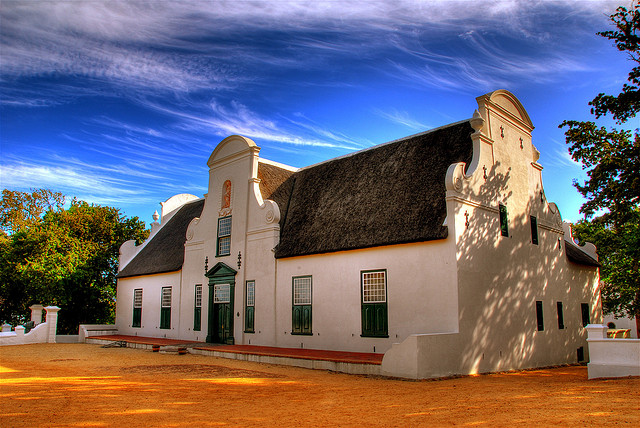If you love Cabernet Sauvignon, look to
South African wine for hot values.
Before the last twenty years, South African wines barely reached the bottom of the grocery store shelf. Most of the wine produced in the country was directly distilled into brandy. Today, the story is different. South African wines have emerged as some of the highest-valued red and white wines.

Did you know? South Africa produced Constantia, one of the world’s most famous wines during the early 1700s… (before Cabernet Sauvignon became famous!!
South African Wine Map

South Africa’s most planted white and red grapes are Chenin Blanc and Cabernet Sauvignon.
South African Red Wines
Cabernet Sauvignon 26,165 acres (2021)
There is a savory complexity to South African Cab, which makes it a delightful alternative to the more fruit-forward options from Paso Robles or Sonoma, California. Imagine black pepper, bell pepper, and currant rounded out with blackberry and plum. South African Cabernet Sauvignon fits somewhere in between New World and Old World; it’s savory, but without all the grit of a French Bordeaux Supérieur. Check out these wine regions:
- Paarl & Stellenbosch (Coastal Region)
- Franschhoek (typically more herbaceous)
Syrah 24,577 acres (2021)
Syrah from South Africa is becoming popular due to its dark spiced fruit flavors and chocolate-like richness. It’s important to note that since Syrah grows throughout South Africa, it has a wide range of styles. You will find savory wines from cooler regions such as Paarl and Stellenbosch and richly intense wines from dry areas such as Robertson and Swartland.
- Paarl & Stellenbosch (Coastal Region)
- Robertson
- Swartland (includes Malmsbury and Darling)
Pinotage 17,425 acres (2021)
Pinotage is South Africa’s very own grape variety; a cross between Pinot Noir and Cinsault. However, watch out, Pinot Noir lovers, just because it has some of Pinot Noir’s DNA doesn’t mean it tastes the same! Pinotage offers juicy raspberry to blueberry fruit flavors with spiced chocolate and tobacco. The wines are much denser, have higher alcohol content, and are typically more savory than Pinot Noir. Pinotage often gets blended with Syrah.
Merlot 13,734 acres (2021)
Merlot is widely used as a blending grape with Cabernet Sauvignon. Still, you can find several single-variety Merlot from the Coastal Region.
Other South African Reds
Several other red wines are growing in South Africa, including Malbec, Petit Verdot, Pinot Noir, and Cinsault (spelled ‘Cinsaut’ in SA). While most of the above varieties are blended, South Africa’s cooler climate regions (including Elgin and Walker Bay) are making single variety Pinot Noir.
- Other Wine Varieties: Petit Verdot, Malbec, Pinot Noir, Cinsault, and Cabernet Franc
- Esoteric Wine Varieties: Cornifesto, Roobernet
South African White Wines
Chenin Blanc 43,754 acres (2021)
The most planted grape variety in South Africa is Chenin Blanc, which is also known as Steen. Most of the Chenin Blanc produced goes into brandy production, but there’s a growing excitement internationally for South African Chenin Blanc. A peachy and floral grape variety not unlike Alsatian Pinot Gris and Viognier, although most affordable examples are only slightly floral and dry on the palate. You could easily substitute your usual Pinot Gris for a bottle of South African Chenin Blanc.
- Stellenbosch (floral and aromatic)
- Coastal Region (dry and zesty)
- Swartland (richly fruity)
Colombard 28,446 acres (2021)
Known in South Africa as ‘Colombar’, this esoteric white wine grape from central France (close to Bordeaux) is quite commonly used to add Sauvignon Blanc-like zestiness to Chenin Blanc based white wine blends. Still, a large chunk of the wine production goes toward brandy making.
Sauvignon Blanc 22,847 acres (2021)
If you’re tired of spending nearly $20 for a bottle of New Zealand Sauvignon Blanc, South Africa has you pegged. The flavors of Sauvignon Blanc in South Africa are similar to those in New Zealand; they are zesty, grapefruit-y, and grassy, and usually cost around $10 a bottle.
Chardonnay 16,941 acres (2021)
As a cool climate variety, a lot of South Africa’s regions aren’t particularly well suited for Chardonnay. However, the southern coastline stays cool. Look for Chardonnay from Walker Bay.
Other South African Whites
Other white varietals include Sémillon, Riesling, and Viognier which are often used for blending, but increasingly found in single-varietal boutique bottlings.

A lil’ History on South African Wine
The Dutch East India Company used Cape Town as a resupply stop on the way to India during the 1600s. Settlers planted wine grapes to quench the thirsty sailors. As you can imagine, the wine sucked until the second Governor of Cape Town, Simon van der Stel, focused on making a better vineyard. He began producing a dessert wine called Constantia.
During the mid-1700s to mid-1800s, dessert wines were some of the most in-demand wines of the day. Constantia was as famous as other dessert wines of the day, including Hungarian Tokaji and French Sauternes. Sadly, South Africa’s wine market took a turn for the worse when grape phylloxera completely obliterated its vineyards.